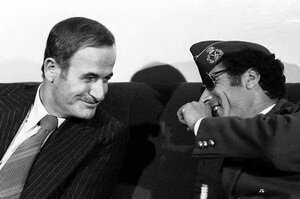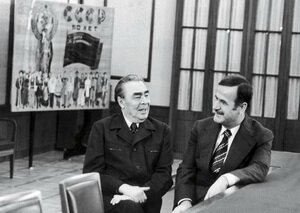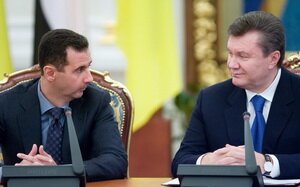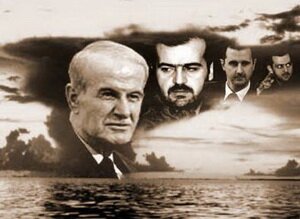
The Independent Analytical Center for Geopolitical Studies “Borysfen Intel” affords ground to the analysts generation for expressing their point of view regarding the political, economic, security, information situation in Ukraine and in the world in general, according to their personal geopolitical studies and analyses.
Note that an authors’ point of view
|
Oleksiy O. Volovych, Candidate of Historical Sciences
Not the Regime, but the State
Many analysts are asking: what makes “B. Assad's regime” so firm? In our view, no political regime as such has firmness in situations of socio - political trials and turmoil, if it is not supported by the majority of the people of its country and efficient state apparatus. According to NATO, 70 % of Syria's population today supports B. Assad. In Syria, we see the firmness not of the regime, but of the Syrian state and Syrian nation. Let's try to define other components of the firmness of the Syrian state under foreign intervention and civil war.
At the end of April this year, answering the question of the Syrian TV channel “Al-Ihbariya” — why, despite all the difficulties, Syria has been withstanding for more than two years, where the state takes such a power and stamina from, — president of B. Assad replied: “The main factor is people. It was not the state itself that withstood; it was its citizens… If it weren't for its people, the state would have fallen apart within a few weeks”. “Speaking about the firmness of the modern Syrian state, it should be noted that it has existed for 70 years since World War II, has certain political and ideological traditions, under the influence of which more than one generation of Syrian citizens has been brought up. Like many other Arab countries, before 1918 Syria was a province of the Ottoman Empire. Between the First and Second World Wars, France ruled Syria under the mandate of the League of Nations. In September 1941, France granted independence to Syria, but the current Syrian state really exists since April 1946, when French troops were evacuated from Syria.
The leading political force of Syrian society during the period after the Second World War has been and still is the Arab Socialist Ba'ath Party (ASBP). Since the development of the modern Syrian state is largely determined and directed by this political force, the idea of the essence of the Syrian state can only be got after having got acquainted with the ideological and organizational fundamental provisions of the Ba'ath Party.
Note: The main objectives of the Ba'ath Party are construction of Arab socialism and uniting Arab countries into a sole state. The main slogans of the Party are “Unity, Freedom, Socialism” and “United Arab Nation (”Ummah“) and Its Immortal Mission”. The ideology of the Ba'ath Party is a synthesis of Arab nationalism and socialism. In its ideological assumptions Ba'athism is close to Naserism of 1950s – 1960s of the last century, that is why not accidentally in 1958 Syria and Egypt were united in one state — the United Arab Republic, which lasted until 1961. Almost simultaneously, in 1963, the Ba'ath Party came to power in Iraq and Syria. In the early 1970s Syrian and Iraqi Ba'athists entered into an alliance with the local communist parties within the framework of the “Progressive Fronts”. Both branches of the Ba'ath Party established friendly ties with the Communist Party of the USSR. In 1978-79, Syrian President Hafez al-Assad and Iraqi President Ahmed Hassan al-Bakr were negotiating on the merger of the two countries. But in July 1979 after the removal of President al-Bakr and Saddam Hussein's coming to power, unification process between the two countries was discontinued, and the alliance with the Communists broken. Apart from Syria and Iraq, nowadays the Ba'ath Party is legal in Lebanon, Palestine, Yemen, and illegal — in other Arab countries. Secretary General of the Ba'ath Party from 1971 until his death in June 2000 had been Syrian President Hafez al-Assad, who had been a member of the Party since the age of 16. Party members are intellectuals, soldiers, peasants, small traders and workers. Ba'ath Party also works with other left-wing political organizations of Syria within the framework of the created in 1972 National Progressive Front (NPF), which, apart from Ba'ath Party, was joined by the Syrian Communist party, Arab Socialist Union and some other parties. NPF's Chart developed a program that included the restructuring of the Syrian society on socialist principles, while relying on workers, creation of a planned economy, abolition of exploitation of man by man, development of people's democracy, priority of the state sector in the economy of the country. The basic principle of the distribution of wealth was proclaimed the principle of “to each according to his/her work”. The Syrian economy is planned. Right now Syria is fulfilling its 11th Five-Year Plan (2011-2015). Large feudal ownership of land has been liquidated in the country. 70 % of agricultural land has been transferred into the ownership of poor peasants, and 30% has been passed into state ownership. Obviously the implementation of agricultural policy of the Baath Party was influenced by the fact that Hafez Assad was born into a large and poor peasant family. In foreign policy, the main priorities have been determined as follows: policy of non-alignment, struggle against imperialism, development of cooperation with former socialist countries. |
 |
| Hafez al-Assad and Muammar Gaddafi, 1977 http://dic.academic.ru/ |
1940s – 1950s were characterized by political instability and frequent changes of power in a series of military coups, when presidents and governments sometimes changed several times a year. By 1970, the short history of independent Syria had already had more than two dozen military coups. The coup organized by Hafez al-Assad was the last one. The father of the current Syrian President Hafez al-Assad became the 15th president of the country and remained in office for 30 years, having been elected to the post 5 times in a row, although those elections can't be called democratic and transparent. H. Assad was a charismatic politician, respected in the world of politics. Y. Stalin called him the Middle East and Arab Bismarck.
H. Assad was respected even by his opponents and enemies. U.S. President Richard Nixon called him “a genius”. According to another US President, Carter, H. Assad was “a brilliant man”. The former U.S. Secretary of State Henry Kissinger described H. Assad as the “most interesting personality in the Middle East”. At the funeral of H. Assad in June 2000, were present Presidents Bill Clinton, Jacques Chirac, V. Putin, Chancellor Gerhard Schroeder and even Israeli Prime Minister E. Barak.
Of course, at the time of Hafez al-Assad, Syria, like the vast majority of Arab countries, was not a model of democracy, because in the second half of the twentieth century totalitarianism and autocracy in the Middle East were at their peak. Arab presidents like kings had been ruling their countries for 20 - 30 years. Such was the era, and Syria could not be an exception. Syria could not be an island of democracy in the totalitarian Arab Ocean. It should not be forgotten that since the moment of establishment of the State of Israel in 1948, Syria for more than 60 years already has been confronting it, and participated in the wars against Israel in 1948, 1967 and 1973. Since 1967 to the present day, part of the territory of Syria (Golan Heights) has been occupied by Israel. That is why Syria had to hold powerful enough, by Arab standards, armed forces, and this keeps draining the economy of this poor country.
Estimations of the Syrian leader H. Assad's activity may be different, but he had his own understanding of national interests of his people and protected them as best he could. There are different ways to evaluate the Syrian government since H. Assad, but such was the fate of this state and it was no better and no worse than other Arab states. Of course, his activities had both, positive and negative sides; he had his own mistakes and achievements. I think that the results of the H. Assad's activity should be estimated by the Syrian people and no one else. Nevertheless, it can be said that in complicated geopolitical situation H. Assad, with the support of the overwhelming majority of the Syrian people, did manage to maintain and strengthen the Syrian statehood, build a strong, predictable secular state with its own national ambitions and values that occupied a place of honor among the Arab States and in the world, and of which was proud overwhelming majority of the Syrian people.
Relations with Neighboring Countries, Russia and Ukraine
 |
|
Hafez al-Assad was one of the most loyal and consistent friends of the Soviet Union. Leonid Brezhnev and Hafez al-Assad, 1980 http://oleg-butenko.livejournal.com |
Up to 2003, Syria had also had extremely tense relations with its neighbors—Turkey and Iraq. The aggravation of the Turkish-Syrian relations reached its peak in 1998, when Ankara demanded the PKK leader Abdullah Öcalanto be extradited from Syria. The matter went to concentration of Turkish and Syrian troops along the common border. However, thanks to the mediation of Egyptian President Hosni Mubarak, a military conflict was avoided and relations between Ankara and Damascus stabilized. After the Justice and Development Party (JDP) coming to power in Turkey in 2002, relations between Ankara and Damascus have improved significantly and as of 2010 reached the level of strategic partnership. However, with the outbreak of civil war in Syria in 2011, they have deteriorated sharply, and today Turkey has become the springboard of foreign intervention in Syria.
Relations between Damascus and Baghdad in the last third of the twentieth century had also been strained. The main cause of this tension was a struggle between H. Assad and Saddam Hussein for leadership in the Arab world after the death of Gamal Abdel Nasser in 1970, as well as ideological differences within the “Ba’ath Party”. This explains the fact that during the war of the coalition led by the United States for the liberation of Kuwait from Iraqi occupation, H. Assad formally supported the coalition. Unlike his father, Bashar al-Assad, having come to power, improved relations with Baghdad and strongly condemned the occupation of Iraq by the United States and its allies in March 2003.
Hafez al-Assad was one of the most loyal and consistent friends of the Soviet Union. Today, Syria's attitude to Russia is the friendliest one among Arab countries. With the assistance of the Soviet Union, about 100 industrial facilities had been built in Syria. In 2008, the trade turnover between Russia and Syria amounted to almost 2 billion US dollars. Deliveries of Soviet and Russian weapons to Syria over the past 50 years have exceeded 26 billion US dollars. In 1970s, two Syrian ports on the Mediterranean coast — Latakia and Tartus — began being used as points of logistics of the 5th Operational Squadron of the Soviet Navy. Today, these ports are used by Russian Navy ships.

|
| Former Ukrainian President Leonid Kuchma in 2002 awarded the current leader Bashar Assad's with Order of Prince Yaroslav the Wise http://korrespondent.net/ |
Traditionally friendly have always been Ukraine's relations with Syria, which until recently were the second largest country in the Middle East in terms of bilateral trade with Ukraine (1.171 billion US dollars in 2008). For Syria, Ukraine is the largest exporter among the countries of Central and Eastern Europe. The visit of President Leonid Kuchma to Syria in April 2002 gave a powerful impetus to the development of relations between the two countries. Quite successful was also a visit of Bashar al-Assad to Ukraine at the beginning of December 2010. During the Ukrainian-Syrian talks, President Viktor Yanukovych said that Ukraine “considers the Syrian Arab Republic as one of the most influential and authoritative states not only in the Middle East, but also in the entire Arab and Islamic world”.
 |
|
Viktor Yanukovych: Ukraine sees Syria as one of the most influential countries in the Arab and Islamic world http://2000.net.ua/ |
In his interview on TV on the 29th of August this year, referring to the situation around Syria, Ukrainian President Viktor Yanukovych said, “We are totally against solving these issues by military means.” According to the head of the Ukrainian state, the escalation of the conflict in Syria will lead to a humanitarian catastrophe. I think that this position of President Viktor Yanukovych is shared by the vast majority of the Ukrainian people in both, the East and West of the country.
Speaking on the 20th of September at the opening of the 10th Annual Meeting of YES "Ukraine and the world in the era of changes: factors of success" in the Livadia Palace of Yalta, President of Ukraine Viktor Yanukovych offered Ukraine's services for the destruction of chemical weapons in Syria: "We have the experience, we have mobile plants that are patented by Ukraine and which in practice shown to be effective. And we are ready to use them for fast destruction of chemical weapons in Syria". According to Yanukovych, "It is positive that lately events in Syria have begun to develop through political settlement, and today it is important to maintain this trend". Viktor Yanukovych also said that "military actions in Syria are a concern to the whole world and any normal person treats them negatively."
Bashar al-Assad —a charismatic leader and reformer.
Such a state was inherited by Bashar al-Assad (47). Prior to the death of his older brother Basilio in a car crash in 1994, Bashar was not planned to be elected to the presidency. Historically, over the last 50 years in the major leadership positions in the country had been exclusively appointed representatives of not numerous Muslim confession— the Alawites, to which the president B. Assad himself belongs. Among the Muslims of Syria, Alawites make up only 12% (Sunnis — 74%). Naturally, a large part of the Sunni population of Syria is not happy with such a situation.

|
|
Bashar al-Assad is a charismatic leader and reformer |
The destabilization of the political situation in the country is due to a number of chronic social problems: relatively low standards of life of the majority of the Syrian population (13 % of Syrians live on 1 US dollar a day, and 30% — on less than 2 US dollars a day; high level of unemployment — nearly 8% in 2010; presence on the territory of Syria of a significant number of refugees — from Iraq (over 1 million) and Palestine (500 thousand), on whom the Syrian government spends up to 1.6 billion US dollars a year.
In recent years the country has carried out reforms in the sphere of economy, social protection, education, healthcare, government, civil society development. Measures have been taken to combat corruption, rise wages and pensions. However, these reforms have been implemented only partially. In April 2011, in Syria was cancelled the state of emergency which was there since 1963, but the role of law enforcement agencies and numerous special services did not become smaller. February 26 this year in Syria was held a referendum on the adoption of a new Constitution, according to which 90 days later parliamentary elections took place. In the new Basic Law there is no article about the leading role of the founded in the 1944 Arab Ba’ath Socialist Party, is officially secured a multi-party system, there are no articles defining Syria as a socialist state. Instead of socialism, the main accent in the constitution is now on the concept of human rights.
In the situation of the Civil War, May 8, 2012 in Syria were held elections to the Parliament — the People's Council. 51.26 % of the total number of Syrian citizens who are eligible to vote took part in the elections. The elections were won by the formed by the ruling Ba’ath Party, Bloc “National Unity”, which received 183 out of the 250 seats in Parliament. According to President Bashar al-Assad, the vote showed that majority of Syrians supports the country's political system. B. Assad has repeatedly put forward peace initiatives, offered to stop fighting and sit down at the negotiating table, but his proposals have been consistently rejected by the opposition, the radical part of which demands his unconditional resignation.
In foreign policy, the main strategic allies of Syria are Russia, Iran and China. Long-term cooperation between Tehran and Damascus, supplies of Russian weapons and military equipment to Syria, as well as Syria's supporting various Palestinian organizations and Lebanese party “Hezbollah”, invariably cause dissatisfaction of Tel Aviv and Washington. In 2003 B. Assad condemned the occupation of Iraq by Coalition Forces of Western countries led by the United States. In response, the United States accused Damascus of promoting the penetration of Arab terrorists into Iraq to fight coalition forces. The USA has repeatedly imposed economic sanctions on Syria, and Israel inflicted air strikes on Syrian territory, the latest of which was conducted on the 30th of January.
Today, there is a real threat that if the Syrian opposition with the support of foreign mercenaries, Saudi Arabia, Qatar, Libya and Western countries does win, the present Syrian state will be destroyed, and I personally have great doubts that on its ruins something better will be built. However, I would like common sense and good will to win, and the Syrian conflict to be resolved at the negotiating table, for which repeatedly have called President B. Assad, UN, Russia, China, India, Brazil and other countries of the world. Today many people, not only in Syria but beyond, understand that in the current circumstances the political system existing in Syria, with B. Assad or with some other legitimately elected president, is the only guarantee of integrity and sovereignty of the Syrian state.


